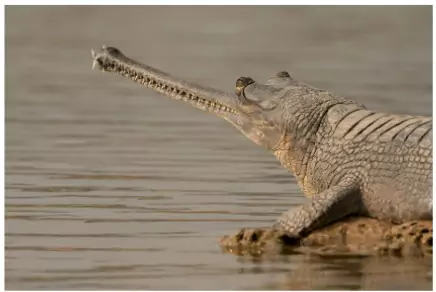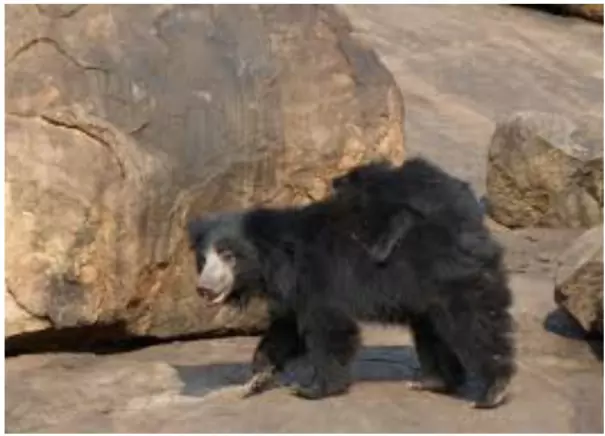The Standing Committee of National Board for Wildlife (SCNBWL) has recommended the inclusion of gharial and sloth bear in the Species Recovery Programme of the Centrally Sponsored Scheme for Integrated Development of Wildlife Habitats.
About Integrated Development of Wildlife Habitats
- It is a centrally sponsored Scheme launched focused on enhancing wildlife conservation through habitat improvement and protection.
- Objective: It provides financial and technical support to states and union territories for various wildlife activities, including habitat restoration, anti-poaching measures, and community engagement.
- Implementing Agency: Wildlife Institute of India (WII)
- Funded under: National Compensatory Afforestation Fund Management and Planning Authority (CAMPA)
- Components of the Scheme:
-
- Support to Protected Areas: This includes national parks, wildlife sanctuaries, conservation reserves, and community reserves.
- Protection of Wildlife Outside Protected Areas: This component focuses on conservation efforts outside designated protected areas.
- Recovery Programs: These programs are designed to save critically endangered species and their habitats.
- Target Species under ESRP: total 22 species; 16 terrestrial and 6 aquatic species as listed below.
- Asian Wild Buffalo; Asiatic Lion; Brow-Antlered Deer or Sangai; Dugong; Edible Nest Swiftlet Gangetic River Dolphin, Great Indian Bustard, HangulIndian Rhino or Great One-horned, Rhinoceros Jerdon’s Courser, Malabar Civet, Marine Turtles, Nicobar Megapode, Nilgiri Tahr, Snow Leopard, Swamp Deer Vultures, Northern River Terrapin, Clouded Leopard, Arabian Sea Humpback , Whale , Red Panda and Caracal.
About Gharial (Gavialis gangeticus)

- Habitat & Distribution
- Prefers deep, fast-flowing freshwater rivers
- Endemic to Indian rivers like the Chambal, Yamuna, Ganga, Sharda, Girwa, Gandak, Ramganga, Mahanadi and Brahmaputra.
- Major populations found in:
- Chambal River (Madhya Pradesh, Rajasthan, Uttar Pradesh)
- Girwa River (Katarniaghat Wildlife Sanctuary, UP)
- Rapti-Narayani River system (Chitwan National Park, Nepal)
- Dependent on sandy riverbanks for nesting
- Conservation Status
- IUCN Red List: Critically Endangered
- Wildlife (Protection) Act, 1972: Schedule I
- CITES: Appendix I
- Key Characteristics
- Possesses the longest and narrowest snout among all crocodilians – adapted for catching fish
- Adult males develop a distinctive bulbous growth on the snout called a ghara (used for vocalization and mating rituals)
- Highly aquatic, rarely ventures onto land except for basking and nesting
- Plays a key role in maintaining the riverine ecosystem health
About Sloth Bear (Melursus ursinus)

- Habitat & Distribution
- Native to Indian subcontinent – found in India, Nepal, and Sri Lanka
- Inhabits tropical dry forests, moist deciduous forests, and scrublands
- Reported from five major biogeographic zones in India:
- Peninsular India, Western Ghats, Deccan Plateau, Gangetic Plain and North-East India
- Conservation Status
- IUCN Red List: Vulnerable
- Wildlife (Protection) Act, 1972: Schedule I
- CITES: Appendix I
- Key Characteristics
- Medium-sized bear with a long, shaggy black coat and a white V-shaped chest patch
- Specially adapted snout and long tongue for feeding on termites, ants, and honey
- Nocturnal and solitary by nature, though females with cubs may be seen during the day
- Unlike other bears, sloth bears carry cubs on their back
About National Board for Wildlife
- Statutory Body: The National Board for Wildlife (NBWL) was constituted by the Central Government under Section 5A of the Wildlife (Protection) Act, 1972 (WLPA).
- It was established through an amendment of the WLPA in 2022.
- Role of NBWL: The board serves an advisory function and provides recommendations to the Central Government regarding wildlife conservation policies and measures.
- Mandatory Approvals by NBWLas per WLPA:
- Altering the boundaries of national parks and wildlife sanctuaries or de-notifying Tiger Reserves.
- Constructing tourist lodges within protected areas.
- Destruction or diversion of wildlife habitats for development projects.
- Organizational Structure: The NBWL is a 47-member committee with the following key members:
- Chairperson : Prime Minister of India
- Vice-Chairperson : Minister of Environment, Forests & Climate Change
- Member-Secretary: Additional Director General of Forests (WL) and Director, Wildlife Preservation
- Other Members
- 3 Members of Parliament (2 from Lok Sabha, 1 from Rajya Sabha)
- 5 Representatives from NGOs
- 10 Eminent conservationists, ecologists, and environmentalists
- Government secretaries from various departments
- Chief of Army Staff, Director General of Forests, Tourism, etc.
- Standing Committee of NBWL: The Standing Committee of NBWL functions as an independent body under the NBWL.
- Composition: Consists of up to 10 members from the NBWL.
- Chairperson: Minister of Environment, Forest, and Climate Change.
- Difference from NBWL: The Standing Committee focuses on project clearances, while the NBWL is responsible for policy decisions.
Read More About: Gharials
![]() 14 Jul 2025
14 Jul 2025



